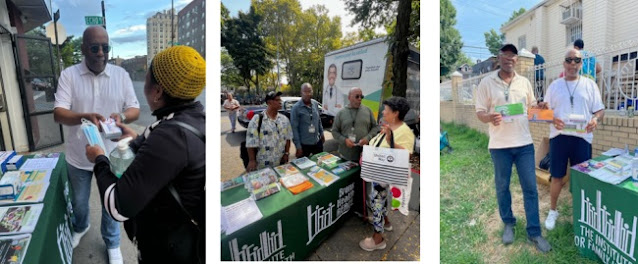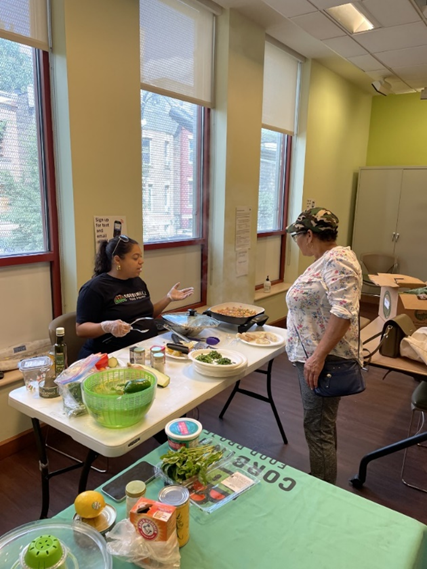Shen’naque Sean Butler and Francisco Marte, Founder of Bodega and Small Business Group
This article was written
by Kelly Moltzen, Program Manager at Bronx Health REACH, Charmaine Ruddock, Project Director at Bronx Health REACH, and Bronx
Health REACH Coalition member Shen’naque Sean Butler.
African Americans have
faced injustices in the food system ever since the days
of enslavement, when Africans brought to America lost the food sovereignty they
had in their native lands, and as slaves, were forced to subsist on meager food
rations of poor dietary quality such as pig intestines, lard and cornmeal. But
resistance to these injustices has existed for just as long, with enslaved
people cultivating crops from Africa such as okra, yams, black-eyed peas, and creating
dishes using ingredients that were native to Africa when they could.
Fannie Lou Hamer’s
founding of the Freedom Farm Cooperative in 1967 as a rural economic
development and political organizing project was a later action in the Black
food justice movement. The Freedom Farm Cooperative sought to uplift Black
families through food provisions, such as vegetable gardens and pig-raising,
and through community support for housing development and education. By
providing food and financial services, the Cooperative allowed Black families
to be self-sufficient. This Cooperative is seen by many as a foundation for the
modern food security and food justice movements.
In the Bronx, a leader that
continued this fight for food justice is Karen Washington, a Black urban farmer,
and co-founder of the Black Farmer Fund. A James Beard 2014 Leadership Award
Honoree, she worked to dismantle what she so aptly termed “food apartheid” in
Black communities.
Recognizing the
historical injustices and the power of grassroots community advocacy to address
those injustices, Bronx Health REACH, since its inception, has been working with
community partners to advance food justice. This has been done through efforts
such as encouraging policy makers and elected officials to increase access to
affordable fresh produce at farmers markets, promoting farmers and farmers
markets to community members, and supporting faith-based organizations’
establishment of gardens.
For more than a decade, Bronx
Health REACH has been involved in supporting local business owners selling
healthy food, collaborating with the Bodega and Small Business Group (BSBG) to train
bodega owners to sell healthier food, and promoting those healthier options
through the creation of the “Don’t Stress, Eat Fresh” consumer campaign. In
2019, Bronx Health REACH supported Bronx community member and food justice
advocate Shen’naque Sean Butler to implement his vision for a healthy bodega
initiative.
Shen’naque Sean Butler’s
family migrated from Savannah, Georgia, to New York during the Great Migration,
seeking economic opportunities and escaping racial violence. Unfortunately, the
racial injustices they sought to escape followed them in one form or the other,
one of which was redlining—a government policy that systematically removed
resources from Black communities. Redlining has had a lasting impact,
contributing to the creation of food deserts in areas like the Bronx, where access
to fresh and affordable food is severely limited.
As a descendant of
American chattel slavery, Shen’naque Sean Butler carries not only the legacy of
pain but also the resilience of his ancestors. In 2019, inspired by his late mother,
Jocelyn Butler, Shen’naque founded FRESCH (Food Revolution Empowering
Sustainable Community Health), to address food insecurity and promote healthier
eating habits in the Bronx by connecting local food systems. He implemented a pilot
group purchasing model where healthy grab-and-go food items were sold at
bodegas for customers to purchase at affordable prices. This initiative
included bodegas both within and outside the BSBG network.
The initiative delivers
plant-based meals to local bodegas, providing nutritious options in areas where
fresh food is scarce. FRESCH also hosts workshops and seminars to educate the
community about healthy eating and advocates for policy changes to improve food
transparency and marketing practices.
In 2024, building on
FRESCH and the previous work with BSBG, Bronx Health REACH received funding
from the New York Health Foundation to collaborate with BSBG, Collective Fare,
Shen’naque Sean Butler, and others to pilot a sustainable business model for
bodegas to sell healthy, culturally relevant grab-and-go items, in the Hunts
Point section of the Bronx.
The effort to establish a healthy food retail environment with culturally relevant, affordable options for communities of color has continued, gaining momentum to counter the injustices that have gotten worse in the food system over the past several decades. Dr. Marcia Chatelain, a professor of African American history and author of the book, Franchise: The Golden
Arches in Black America explains an
association between the food retail environment and being “Black.” Dr.
Chatelain points out that in the 1960’s, the federal government, through a
series of efforts, encouraged the creation of Black businesses as an
opportunity to build wealth and create badly needed jobs. During this time, the fast food industry lobbied
government and convinced civil rights organizations that fast food franchising
could be good for building Black wealth. Yet, the low-wage jobs created through
the franchising model, coupled with the creation of unhealthy food environments
in Black communities, turned out to have detrimental economic and health consequences
in these communities. Exacerbating the problem was the practice of many food companies
associating Black culture with their industrialized food through targeted predatory
marketing of fast food and other unhealthy food products. This has had
disastrous effects on the health of consumers, with disproportionate impacts especially
seen in Black communities.
Despite all of this, the movement that has long
embraced the narrative of cultural pride focused on an entrepreneurial model of
building Black owned food businesses promoting healthy food, establishing a new
cadre of Black farmers, and farmers markets, and securing new retail outlets
for those foods continues. The goal of such a movement is still to improve the health
and lives of Black communities.













































